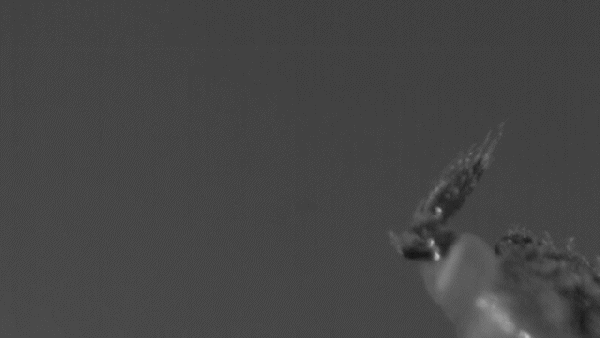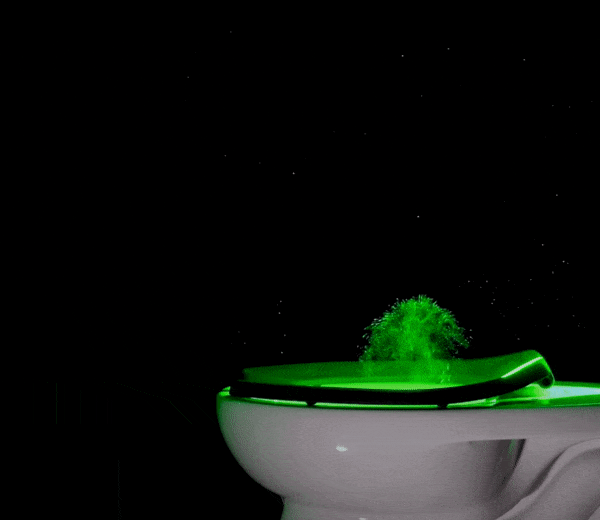Physics
Explaining the Colorful Quantum Discoveries That Earned the Nobel Prize in Chemistry
Moungi Bawendi, Louis Brus and Alexei Ekimov won the award for their work developing tiny “quantum dots” that light TV displays and enable medical imaging
Scientists Studying High-Speed Electrons With Lasers Win Nobel Prize in Physics
Pierre Agostini, Ferenc Krausz and Anne L’Huillier created pulses of light so short that they can be used to observe the behavior of electrons
Mysterious Planet-Like Objects in the Orion Nebula Are Baffling Astronomers
The James Webb Space Telescope has observed dozens of Jupiter-mass, often paired objects, nicknamed JuMBOs, raising questions about how they formed
The Baseball Player-Turned-Spy Who Went Undercover to Assassinate the Nazis' Top Nuclear Scientist
During World War II, the OSS sent Moe Berg to Europe, where he gathered intel on Germany's efforts to build an atomic bomb
James Webb Telescope Captures the Glowing Ring Nebula in Magnificent Detail
The colorful ring, located some 2,600 light-years away from Earth, is made from the remnants of a dying star
The Real History Behind Christopher Nolan's 'Oppenheimer'
The "father of the atomic bomb" has long been misunderstood. Will the new film finally get J. Robert Oppenheimer right?
Scientists Find Ghostly Neutrino Particles From the Milky Way
It's no surprise that neutrinos come from within our galaxy, but the tiny, chargeless particles are very hard to detect
Gravitational Waves Create a Constant 'Hum' Across the Universe
Breakthrough research suggests the continuous ripples in spacetime could be caused by pairs of supermassive black holes, spiraling toward collisions
An Exclusive Behind-the-Scenes Look at the Los Alamos Lab Where J. Robert Oppenheimer Created the Atomic Bomb
In never-before-seen photographs, explore the secret U.S. facility and home to the Manhattan Project scientists who developed the first nuclear weapon
This Physicist Uses Drones to Create Giant Light Cones in the Desert
Evoking a key concept in relativity, Elliot McGucken traces out hourglass-like shapes in the sky that stretch as high as a seven-story building
Climate Change Is Making Home Runs Easier to Hit
A new study attributes more than 500 homers since 2010 to increased global average temperatures, an effect that will only increase the hotter Earth gets
The Science Behind the Multiverse in 'Everything Everywhere All At Once'
The movie that won Best Picture imagines a reality composed of an uncountable number of universes
Scientists Are Trying to Figure Out How Animals Follow a Scent to Its Source
Uncovering the varied strategies that animals employ could help engineers develop robots that accomplish similar tasks
NASA's Moon Dust Problem Might Finally Have a Solution
Researchers sprayed liquid nitrogen at spacesuit-clad Barbie dolls to test their novel idea
These Tiny Bugs Urinate by Flinging Droplets of Pee
Sharpshooters are the first example of “superpropulsion” in a living organism, according to new research
The Surprisingly Scientific Roots of Monkey Bars
A century ago, a Princeton mathematician created what would become a mainstay of the American playground
Did Jack Really Need to Sacrifice Himself for Rose?
James Cameron commissioned a study to prove that his characters' tragic ending was inevitable
U.S. Reverses 1954 Removal of J. Robert Oppenheimer’s Security Clearance
The “father of the atomic bomb” was accused of being a communist
Here's What Really Happens When You Flush a Toilet
Using lasers and cameras, scientists visualized the plume of tiny, aerosolized particles ejected from commercial toilets during flushing
Fusion Breakthrough Raises Hopes for Clean Energy
This process that powers stars is still decades away from widespread use on Earth
Page 2 of 26
:focal(4128x2752:4129x2753)/https://tf-cmsv2-smithsonianmag-media.s3.amazonaws.com/filer_public/a3/5d/a35db345-bd5c-4e31-9f97-8344f28dfb6b/gettyimages-1705016177.jpg)
:focal(3954x2354:3955x2355)/https://tf-cmsv2-smithsonianmag-media.s3.amazonaws.com/filer_public/78/c7/78c73514-c052-40bd-820e-91e48e123595/gettyimages-1704131067.jpg)
:focal(700x480:701x481)/https://tf-cmsv2-smithsonianmag-media.s3.amazonaws.com/filer_public/6b/90/6b907f66-bdaf-46c3-af99-9d2c122b31bc/orion_nebula_in_nircam_long-wavelength_channel_1.jpg)
:focal(700x527:701x528)/https://tf-cmsv2-smithsonianmag-media.s3.amazonaws.com/filer_public/bc/15/bc157925-8f49-4f5b-b1fa-a942133c0d4b/berg2.jpg)
:focal(957x506:958x507)/https://tf-cmsv2-smithsonianmag-media.s3.amazonaws.com/filer_public/d3/06/d306ad0e-ed88-4191-9fc7-d96b72ad0989/ringnebula_nircam-e1691025726491.jpg)
:focal(850x489:851x490)/https://tf-cmsv2-smithsonianmag-media.s3.amazonaws.com/filer_public/ac/7f/ac7fc9ab-dd19-4beb-a907-0c87d5e0c3f3/oppenheimer-still1-62df17ed1c2fb-1.jpeg)
:focal(500x281:501x282)/https://tf-cmsv2-smithsonianmag-media.s3.amazonaws.com/filer_public/e0/cf/e0cf229e-6691-4114-a008-ff6c9af10ed5/gal_upgrade_2019week22_icl_214074e16.jpg)
:focal(1066x705:1067x706)/https://tf-cmsv2-smithsonianmag-media.s3.amazonaws.com/filer_public/c8/f4/c8f48b1e-6d24-4dd6-b137-0b343feb8457/gettyimages-st000710.jpg)
:focal(1600x1204:1601x1205)/https://tf-cmsv2-smithsonianmag-media.s3.amazonaws.com/filer_public/6a/68/6a6848fb-d3a1-4696-858b-a4519920df5e/opener_-_julaug2023_f06_losalamos.jpg)
:focal(1024x683:1025x684)/https://tf-cmsv2-smithsonianmag-media.s3.amazonaws.com/filer_public/eb/c6/ebc65ff6-86c3-4aad-a54b-8e7fca76f24c/light_cone_coast.png)
:focal(800x602:801x603)/https://tf-cmsv2-smithsonianmag-media.s3.amazonaws.com/filer_public/56/6c/566c897e-4321-45f9-bb00-9b5852dc88ad/gettyimages-1250401292_web.jpg)
:focal(1200x1051:1201x1052)/https://tf-cmsv2-smithsonianmag-media.s3.amazonaws.com/filer_public/54/f2/54f274bd-c284-478b-85ae-eb4bc68eab45/gettyimages-1471312546.jpg)
:focal(800x301:801x302)/https://tf-cmsv2-smithsonianmag-media.s3.amazonaws.com/filer_public/c9/1f/c91f71f2-1e7b-4976-9568-8293320d0019/smell-navigation-1600x600.jpg)
:focal(512x229:513x230)/https://tf-cmsv2-smithsonianmag-media.s3.amazonaws.com/filer_public/b7/8f/b78f6889-9334-4e81-8260-8eb421f314f8/barbie-1024x457.jpeg)

:focal(770x550:771x551)/https://tf-cmsv2-smithsonianmag-media.s3.amazonaws.com/filer_public/04/2a/042aa7a0-5629-4b3a-a594-c9bb3ee95009/mar2023_d16_prologue.jpg)
:focal(2018x1057:2019x1058)/https://tf-cmsv2-smithsonianmag-media.s3.amazonaws.com/filer_public/e8/75/e8755183-2a69-4e2b-88ee-7ad9b08bda0c/gettyimages-1192757498.jpg)
:focal(1249x916:1250x917)/https://tf-cmsv2-smithsonianmag-media.s3.amazonaws.com/filer_public/cc/b4/ccb4ecc0-f834-4788-bc0b-549ccdd05e13/gettyimages-515177800.jpg)

:focal(1502x1030:1503x1031)/https://tf-cmsv2-smithsonianmag-media.s3.amazonaws.com/filer_public/e0/84/e0846338-ba4c-4f0a-b719-1a311de52b5f/gettyimages-1245580801.jpg)